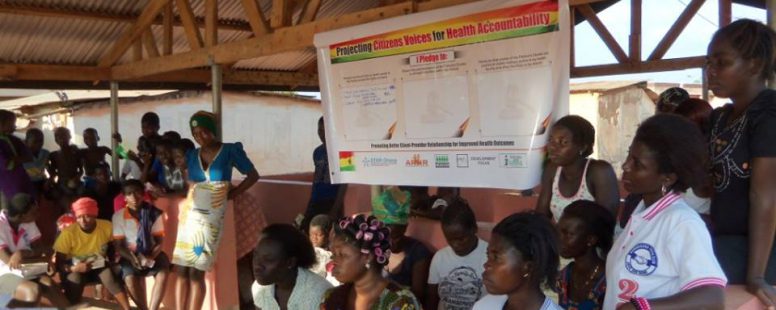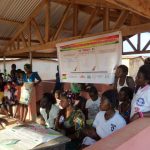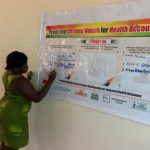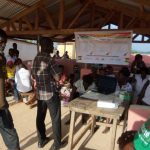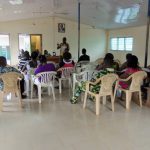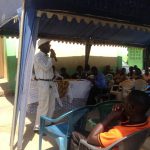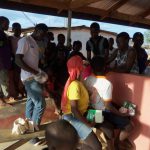Alliance for Reproductive Health Right (ARHR) Maternal Health Project in the Agona East district
Maternal health education as a means to combat maternal mortality, which has bedevilled our communities for some time now, has always been the top most priority of the Young and Lonely Foundation (YLF) and Alliance for Reproductive Health Right (ARHR). Several interventions strategies have been outlined and implemented to promote maternal health education in our various communities where maternal mortality is on the increase.
The result of the survey conducted by YLF and ARHR showed that the Agona East District is one of the Districts in Ghana which recorded high maternal mortality rate. It surfaced after thorough scrutiny of the situation that most pregnant women in the district could not access proper maternal care due to the immotorable nature of the roads, lack of well equipped hospital facilities to serve the maternal health needs of the women in the district, bad attitude of some of the health workers towards the pregnant women and other patients among others.
To help remove these barriers, the Young and Lonely Foundation and Alliance for Reproductive Health Right implemented several intervention strategies to complement the efforts of the government to address these issues in the communities.
TRAINING OF WOMEN FOR ADVOCACY
Maternal health education, sensitisation and awareness creation in the communities are areas that if effectively explored will go a long way to help remedy the problem of maternal mortality. As part of the intervention strategies, Young and Lonely Foundation and Alliance for Reproductive Health Right decided to use these three essential strategies to help the people of the Agona East District to combat maternal mortality.
As part of activities to equip women with leadership skills, YLF organised a leadership and advocacy training workshop for Six (6) women in the district. The women hailed from Mansofo, Namanwona and Otabilkwa. Earlier on, there was a survey in the above communities to assess the health conditions there using certain indicators. After the survey, there was the need to train women from these project communities so that they could in turn educate their colleagues in the communities as well as advocate for an improvement in the health service delivery in the communities. The participants are as follows:
Grace Mensah – Namanwora
Mary Adisi – Mansofo
Sarah Otale – Mansofo
Grace Adams – Otabilkwa
Ama Musah – Namanwura
Aba Amoah – Otabilkwa
The training came off on Sunday, 9th November, 2014 at Agona Swedru. The programme Officer for YLF, Philip Doe Amaglo took the participants through the training process. The training was divided into three (3) sections:
a. Leadership
b. Patient Charter (Rights and Responsibilities)
c. Advocacy and Lobbying for improved Health care delivery.
During the training, various activities were embarked on including series of exercise to equip the participants with leadership skills.
The participants were also made to name a document that spells out their rights as well as some health rights and responsibilities as enshrined in the patient rights charter. After this exercise where some of them did very well, they were all taken through the patient charter by the facilitator so that they could fully grasp it content.
Finally, the participants were taken through the processes of defending their health rights through lobbying, dialogues, sit-downs strikes and letters writing. During this section, the participants understood how to lobby and advocate using the community’s resources.
COMMUNITY DIALOGUE
Young and Lonely Foundation during the period organised a dialogue with the community members to discuss the results of the data that had been collected from their communities on maternal health issues. This programme came off in Nammanwura on 16th November, 2014. From the research conducted earlier on, it was realised that this community scored poorly with regards to the indicators used, thus the need to organise the dialogue in the community so as to create more awareness on maternal mortality and maternal health issues.
After the introduction of the agenda and the purpose of the meeting by the director of YLF, the programmes officer, Philip Doe Amaglo took the participants through the results of the data collected from the communities. The participants confirmed that the results were a true reflection of what they said during the research and for that matter could be made public.
Having completed the presentation of scores, the platform was used to educate the community members on maternal health issues and the diverse roles they can play to eradicate the problem of maternal mortality from their communities. The participants were counselled to use the health facilities and should not feel shy to approach health personnel with their health issues. In addition to this, there was an education on the Patients’ Charter (rights and responsibilities). This is the area where participants asked more questions and contributed more during which the right piece of information where given to clear their perception about using health facilities when they are not well or pregnant.
REGISTRATION OF OMBUDSMAN COMPLAINTS
This is a mechanism that was developed by ARHR to be used to collect complaints that clients may have about health care delivery in the District. From the beginning, the complaint desk was positioned at the office and announcements were made through radio (golden star) and the community public address system (COMPAS) so that clients could register problems they go through whenever they want to access health facilities in the District. Initially, the turnout was very low so the organisation then decided to send the complaint desk to the communities to save the communities from the constraints they may go through coming to the Ombudsman Joint.
Apart from sending the complaint desk to the communities on regular bases, the organisation took advantage of occasions where a lot of people gather to brief them more on the Ombudsman Complaint Desk and encouraged them to register their complaints if they had any. For instance, during the Akwambo Festival in Agona Nsaba, a platform was created where people who had problems with health care delivery in the District registered their complaints. During the period, eighty-seven (87) complaints were registered, most of which came from Duakwa, Salvation Army Clinic. Most of the complaints showed that the midwives in this health facility demanded for compensation after delivering the women of their babies which most of the women could not afford but are compelled to find ways and means to pay. Another issue they raised was the fact that some of the Nurses show lukewarm attitudes towards clients and would not attend to them even in emergency. These barriers they said are discouraging them from using the health facilities and for that matter something should be done about it.
During this quarter, ARHR personnel and the Ombudsman Complaint Software developer came to monitor what was being done on the field on 5th Novermber, 2014. They were satisfied with the work done so far and urged the officers in charge to continue with the good work they are doing. The complaints registered were put in a report form and sent to the stakeholders (health director, planning officer)
The desk has been very useful as some of the complaints made especially on the Nsaba Health Centre were worked on when they were brought to the fore during stakeholders dialogues.
DISTRICT LEVEL DIALOGUE WITH STAKEHOLDERS
As part of the effort to bridge the gap between the District and the various stakeholders, the Young and Lonely Foundation in collaboration with Alliance for Reproductive Health Right held a meeting with the various stakeholders, the traditional authorities and the community members on 21st November, 2014 at the Nsaba District Assembly Hall.
During the programme, the queen mother of the Nsaba traditional area who chaired the programme expressed her gratitude to the stakeholders for their continuous efforts to improve the health care system of their respective communities and the nation at large. She then pledged to do everything within her power to help solve the problem of maternal mortality in her jurisdiction and the nation as a whole.
The Director of Young and Lonely Foundation, Mr Gilbert K. Germain, also addressed the gathering and made it known to them that one of the major objectives of YLF is to serve as a link between the community and their service providers. He again emphasised on the fact that every citizen of this country has the sole right to enjoy the full benefits of the taxes they pay.
Mr. Germain added that, the challenge that a lot of people face in the district in respect to enjoying their right as tax payers is the fact that most of them are not really educated and so do not know the exact way to question government constructively on their basic rights to be enjoyed. He then assured the participants that, it is for the above reasons that YLF has come to their doorstep.
When it got to the turn of Mr Philip Doe Amaglo, the programmes manager of YLF, he stressed on what had been done so far about the complaints gathered. He explained to the gathering the research that was conducted in the field and its findings. According to him, the research conducted in the field showed that clients have problems concerning the functionality of the NHIS. They claim that they have to move all the way to Agona Swedru in a different district which is costly. Also, because the NHIA is serving two districts, the queues there are very long and one could spend three days before they are registered.
It also came to light that, Agona East District happens to be the second highest rated community in teenage pregnancy in central region. Mr. Doe continued to say that, access to contraceptives in our part of the country as well as education on its use is very crucial since the lack of knowledge on these things will lead to the rise in maternal mortality.
Mothers in these three communities also expressed their concern on the issue under discussion during the data collection process and this also yielded several results. Mr. Doe said that, the resources and time invested in data collection process by the NGO is in order to gear service providers concerned towards the disbursement of funds so that appropriate facilities can be provided to alleviate the plight of the people. He concluded his address by taking the stakeholders through the findings of the data collected.
In the course of the meeting, a platform was created for the community members present to interact with the various stakeholders where they got the opportunity to ask questions on issues worrying them and also got to know about what the authorities are doing to help address their concerns raised through the Ombudsman complaint system.
Mrs. Edith Gadagoe (Agona East District Planning Officer) in responses to the concerns raised by most members of the community assured the house that, mechanisms have been put in place to reduce maternal mortality. She added that, more effort is being made to educate traditional birth attendants as to how to upgrade themselves to meet the challenges of mothers at birth since they serve as the first point of contact. She proceeded by saying that, the district is looking forward to providing NHIA office in the district next year. The district is lobbying for more midwives in order to meet the health needs of the communities.
At the end of the meeting, YLF launched a banner on PROJECTING CITIZENS’ VOI CE FOR HEALTH ACCOUNTABILITY as an initiative to promote maternal health in the communities. As part of this initiative, the Stakeholders signed against their names as a pledge to do something about the maternal mortality situation in their capacities.
CHALLENGES
• Some neighbouring communities where YLF could not reach continue to call on the organisation to come to their aid with their education package
• Inadequate funds to do follow ups or support community based projects that clients embark upon as a result of our intervention.
• Teenage pregnancy is on the increase especially in communities where we could nor reach with our education
RECOMMENDATIONS
• The scope of our projects should be expanded to so that more communities in the District can benefit from the interventions of the organisation
• Follow up arrangements should be made so that we can prevent relapse as well as support initiatives by clients in the communities.
• Education on family planning should be embarked upon with some family planning commodities provided so as to nip the problem in the bud.
CONCLUSION
This project could not have come at a better time than this. In fact, it has improved the health seeking behaviours of clients’ especially pregnant women and nursing mothers. In the communities where the education was carried out, clients are now abreast with maternal health issues including their rights and responsibilities. The women who were trained during the last quarter of the project have started making some impact. They are meeting their colleagues in groups to discuss maternal health issues and how they can use community resources to sustain the interventions in their communities. The challenge is that there is a growing teenage pregnancy phenomenon in the District and the organisation is compelled to do something about the situation before it affects the maternal health success stories so far.
All in all, the project was success and we are looking forward to doing some follow ups to find out how communities are faring after the project implementation period.

